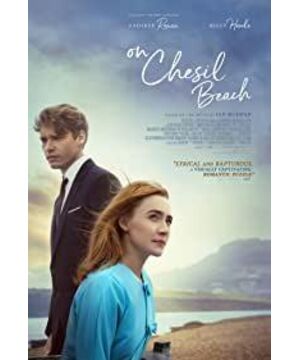The 94-year-old sister Saoirse Ronan has become more and more powerful as an actress. She has been nominated for two Oscars for her new film, "On Chesil Beach".
The film is adapted from the novel of Ian McEwan, one of the most influential writers in the British literary world. Before that, his novels "Children in Time", "Children's Act", and the popular "Atonement" have successively brought to the screen. Coincidentally, in the movie "Atonement", Saoirse Ronan played the "scheming" girl whose jealousy exploded and adapted the fate of the hero and heroine. Her deep blue eyes left an indelible impression in the close-up shots that lasted for more than ten seconds in the film. Combined with the peculiar soundtrack from the typewriter in the background, it can be described as a masterpiece in film history. After the experience of "Miss Bird" and "Brooklyn", Saoirse Ronan has enough confidence to play the leading role in "On Chesil Beach".
The fat man was surprised to find that in "On Chesil Beach", Saoirse Ronan's "Kate Winslet"-style solid, natural acting has been seen. In the film, the heroine played by Saoirse Ronan, who is tough and vulnerable, confident but inferior, has anxiety under forced composure, and has repeated emotions after losing control, has been switched freely and naturally by Saoirse Ronan. The double blue eyes are even more "soul-inducing", and the twists and turns of the character's heart are fully revealed between the eyebrows and eyes.
"On Chesil Beach" is about the eternal motif between men and women. Combined with the current hot topics, the metoo movement, and a series of recent violations in the mainland, it is very interesting and thought-provoking.
Talk about the movie first, then the attitude. The story of "On Chesil Beach" is very interesting. It tells the story of the marriage of newlyweds Edward and Florence that ended in 6 hours, and the love that passed away in a lifetime.
Their relationship and marriage rift occurred in that awkward bedtime sex, dozens of minutes of interlude "foreplay", dozens of seconds of "entering" the main topic, and they regretted the original parting. In order to expand the 6 hours of story information, "On Chesil Beach" makes extensive use of "stream-of-consciousness" reminiscence narratives in the first and second acts.
When a good director makes a movie, they carefully select every image and sound that makes up a story. Making a movie is like turning a painting into a piece of a puzzle. Editors and directors put the puzzle pieces back together while maintaining the integrity of the original story. When the audience sees the film, they experience every shot and every sound as if they were starting a puzzle piece by piece, and the point is to make sure that the audience can put the pieces together "as is," which is to understand the original meaning of the story. The main story is the embarrassing encounters of the two newlyweds during their newlywed honeymoon.
For example, during the evening meal, I encountered the "interruption" and ridicule of the two waiters; for the first time, there was a dispute because of disagreement; especially the foreplay, the main scene, and the follow-up composed of the long bed scene, the three paragraphs made people laugh At the same time, the embarrassing scene of anxiety and anxiety amplifies the discomfort between the male and female protagonists, laying the groundwork for the tragic fate that follows.
In this bed scene, from time to time, the film takes the audience into the inner world of the characters with the "wandering minds" of the male and female protagonists. Through the memories of the two, they understand the characters' characters, family composition, and shape the characters;
While depicting the beautiful "love at first sight", there is also an incredible fate for life.
The director with a lot of scheming fills his memories with happiness, but creates contradictions in the reality of the newlywed bed scene. One side is the gilded memory, and the other side is the gloomy present. This conflict that is about to be revealed makes the present performance even more heart-wrenching. Rapidly increasing the tension of the story. Not only does it play with structural intertextuality in the dual-line narrative, the film is most commendable for using various narrative methods to "fill" the rectangular screen with emotion! The word full comes with great energy and drive, and emotion is the essence of a movie, and every image of a movie is about emotion.
The emotion of the film is two-way, the director shapes the emotion on the screen, and these emotions can resonate with attention and generate empathy. "On Chesil Beach" fills the screen with details and narrative, bringing a full emotional flow to the film. Under the "first" intercourse between the two, the embarrassment of capitalization brought jerky and uncomfortable. The director goes to great lengths to express the tension and tenderness of the characters with various body close-ups. For example, the heroine's clothes that the hero can't pull off, the suspender stockings that the heroine is required to take off by herself, and the bad tongue kiss that looks very sloppy;
The heroine also has a "naive" disproportionate to her age in sexual matters, a distaste for surreptitiously reading books of both sexes, her hand grasping the sheets when lying on the bed, and her feet constantly grinding while eating.
These body movements make the audience feel like sitting on pins and needles and experience a lingering sexual experience. One or two important elements often appear in the film screen to highlight the core of the whole story. In "On Chesil Beach", the facial expressions of the characters become the center of the narrative under a large number of close-ups, and contain a lot of stories. information.
Through the expressions of the two protagonists, the audience can see the ins and outs of this "torture" sex scene. The reason why "On Chesil Beach" is unsatisfactory is that the film provides a variety of sensory subtexts. In addition to the character expressions and body language mentioned above, as well as the memoir narrative, the film's composition and scene scheduling are also very delicate. Composition is a selective screenshot taken by the director from the real world, and it is the beginning of manipulating the meaning of the picture. This captures the viewer's attention, allowing them to see and appreciate the most important information in the picture, or trigger a deep understanding of the subtext. The film begins with the two joining hands from a distant beach to a nearby hotel.
In the middle, there is a panoramic presentation from near to far, ending with the separation of the two,
No matter from the selection of the shooting angle or the interaction between the characters, the distance and estrangement gradually appear. The close relationship is gradually lost in the scene scheduling, which makes the audience nervous about the relationship between the two and can't bear it. Among them, the communication between the two people on the abandoned wooden boat on the shore fully demonstrated the "implications" brought by the composition and angle.
Because of the angle, it seems that the heroine is on the boat, and the hero is lonely on the other side, which symbolizes the complete rupture of the relationship between the two and heralds separation.
The film is patiently "filled" in the first and second scenes, and the third act is responsible for emotional breaking out. The third act uses the shortest screen time to describe the experience of the two in the next few decades, and the if-if-choice results of "La La Land" have been re-enacted in this film. If, at that second, he turned his head and she held hands, maybe the result would be completely different.
But if it's just if, the difference between expectation and reality is the power source of the film's narrative, and separation is the perfect seal of love forever, and loss is also the antiseptic magic medicine that true love never expires. Insert a knife, people will not forget.
At the end of the film, "On Chesil Beach" once again left the two protagonists with the possibility of choice, and the open ending amplifies the possibility that an act will cause lifelong regrets. "On Chesil Beach" depicts a poetic collapse, filled with rafting along the river, green grass in the countryside, gentlemen's cricket, Oxford's Bridge of Sighs, and the English Academy;
The soundtrack is a mix of classic and pop, Haydn, Schubert, Mozart, Bach, Chuck Bailey, Elvis, and even Amy Whitehouse. "On Chesil Beach" enriches the story and characters with various narrative techniques, and provides a wide range of interpretation possibilities for an originally small but beautiful emotional entanglement. For example, why does the heroine reject sex; whether the huge class gap between the two has caused tragedy; there is also the change of history, the impact of sexual cognition on love; the heroine's idea of separating true love and sex, whether the division of spirit and flesh Reality and other topics are all explained in the gaps in the film.
The film even provides the possibility to interpret the current hot metoo topic. In fact, in the film, the encounter between the two comes from the unfamiliarity and misunderstanding of sex.
Liu Yu has this explanation for a series of recent events:
Regarding metoo, I especially agree with a term used by a friend: "make-up lessons". Men take lessons on respect and self-discipline, and women take lessons on self-protection. However, since it is a "make-up class", must some minor offenses be measured by today's standards, and must the other party never give up until they are ruined? There is a so-called "law does not retrospect the past" principle in law, and moral principles are naturally not the same (after all, the stability of morality is far greater than that of law), but to measure past behavior by today's standards, maybe a little bit of tolerance can be tolerated? Why don't many girls resist and ask for help on the spot? Because they didn't even know it was sexual harassment, they were "bewildered". When the movement came today, they realized that it was sexual harassment. So in some cases (just in some cases), is it possible that men are equally unaware that flirtatious pats, dirty jokes, and self-assertive sexual probing are sexual harassment? I don't want to see a relationship between men and women that is only vigilant and loses warmth, just as I don't want to see a feminism that only emphasizes rights and denies responsibility.
In the film, the two protagonists do not have time to "make up lessons". When the experience is rich enough, we find that it is actually possible for the two to overcome the obstacles of "then", but their youthful and vigorous determination has created lifelong regrets. The film is very simple, and it tells the truth from an omniscient perspective, why the two of you can't do it, but after changing people, you can! Therefore, ideas affect people's judgments and affect people's behavior.
This is not to whitewash himtoo, but to hope that everything has room for all parties to express, and one general thinking cannot be the only voice. Of course, women's tolerance is premised on men's introspection. If the offender doesn't introspect, apologize, or even hit back, asking women to be tolerant is obviously a joke.
View more about On Chesil Beach reviews











